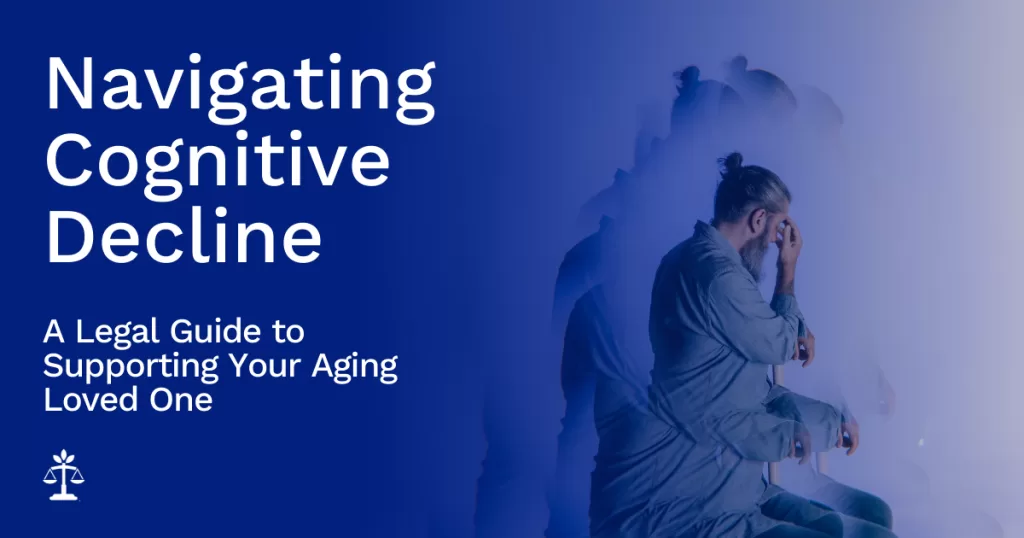In this article you will learn:
- Nearly 1 in 9 Texans age 65 and older is living with Alzheimer’s disease or another form of dementia — a growing reality that places families at risk of legal, financial, and caregiving challenges. Without proper elder law planning, adults with cognitive decline may lose control over critical decisions, and families may face costly guardianship proceedings or gaps in care.
- A strong elder law plan for individuals facing cognitive decline requires four essential documents: a Durable Power of Attorney, a Medical Power of Attorney (or Health Care Proxy), a HIPAA Authorization, and an Advance Directive (Living Will). Together, these tools safeguard decision-making, ensure medical wishes are honored, and reduce the likelihood of expensive, stressful court involvement.
- The process of planning for cognitive decline should be proactive and structured — from immediate protective measures (7 days) to ongoing legal and medical reviews each year. Early action allows individuals to participate in their own planning while capacity is intact, rather than waiting until a crisis forces rushed decisions.
- Despite more than 70% of Texas families acknowledging the importance of planning for aging and incapacity, only a fraction have executed the necessary legal documents. This disconnect leaves vulnerable adults at risk of guardianship, financial exploitation, and uncoordinated care — risks that can be significantly reduced with thoughtful elder law planning.
Silverleaf Legal is here to serve every family, no matter the shape or size. When it comes to elder law, our dedicated team focuses on your loved one’s dignity, independence, and protection. We guide you through the process with care, clarity, and compassion, helping you create a plan that safeguards both your family’s peace of mind and your loved one’s future.
Let me tell you something straight – watching someone you love struggle with memory issues is one of the toughest things you’ll ever face. I’ve seen it happen with countless families in my years practicing elder law here in Central Texas, and it never gets easier.
But here’s the deal – catching these issues early and knowing your legal options can make all the difference in the world. Today, I’m going to walk you through exactly what you need to know about identifying cognitive decline and how to approach your loved one’s doctor both legally and compassionately.
The Warning Signs You Can't Afford to Ignore
Look, we all forget where we put our keys sometimes. That’s just life. But there’s a big difference between normal aging and the kind of cognitive decline that requires medical attention. Here are the red flags I tell my clients to watch for:
Memory Problems That Disrupt Daily Life
We’re not talking about occasionally blanking on a neighbor’s name. We’re talking about forgetting conversations you just had, asking the same questions over and over, or struggling to follow simple directions. When memory issues start affecting everyday activities, that’s when your antennas should go up.
Trouble With Tasks They've Done for Years
If your dad has balanced his checkbook flawlessly for decades and suddenly can’t make sense of the numbers, or your mom who was an excellent cook now burns meals regularly – those aren’t just bad days. They’re potential warning signs.
Getting Lost in Familiar Places
This one scares families the most, and for good reason. When someone gets confused about where they are while driving home from the grocery store they’ve visited weekly for years, that’s a serious concern.
Poor Judgment and Financial Mistakes
I’ve seen situations where an older adult has sent thousands of dollars to scammers or signed paperwork they don’t understand. Sudden poor decision-making, especially around money, is a major warning sign.
Personality and Mood Changes
If your typically mild-mannered father is suddenly flying off the handle at minor frustrations, or your social butterfly mother now refuses to leave the house, pay attention. These changes often accompany cognitive decline.

The Reality of Cognitive Decline
I’ve seen this scenario play out many times in my practice. A loved one who was once organized and independent starts showing concerning changes. Their home becomes cluttered when it was always immaculate. Bills go unpaid. They might confuse their schedule completely, showing up for appointments at the wrong time or day.
Family members often feel paralyzed about what to do next. Should they call their loved one’s doctor directly? Would that violate privacy laws? What if their loved one refuses help?
These are exactly the questions I help families navigate every day.
Taking Action: The Legal and Ethical Approach
If you’re seeing warning signs, here’s my straightforward advice on what to do next:
1. Start With an Honest Conversation
Begin by talking directly with your loved one, but choose your timing and words carefully. Instead of saying, “Mom, I think you have dementia,” try something like, “I’ve noticed you seem frustrated with your bills lately. I’m a bit concerned and wonder if we should check in with Dr. Johnson about it.”
The key is to focus on specific behaviors rather than making broad accusations. And for heaven’s sake, don’t infantilize them! They’re adults who deserve respect, even when they’re struggling.
2. Attend Doctor Appointments Together
If your loved one agrees, go to their next doctor’s appointment. Come prepared with specific examples of concerning behaviors and when they occurred. This concrete information is gold for healthcare providers trying to assess cognitive function.
It can be helpful to keep a simple log for a few weeks before the appointment, noting instances of memory problems or concerning behaviors. This documentation provides doctors with specific examples rather than vague concerns.
3. Communicating With the Doctor When Necessary
Let’s address a common scenario – what if your loved one refuses to see a doctor despite clear signs of cognitive impairment? In these situations, you may need to contact their physician directly.
Here’s what you should know: While HIPAA privacy laws restrict what information doctors can share with you about your loved one, these laws do not prevent you from sharing your observations with the doctor.
If you need to contact a healthcare provider about someone else:
- Put your concerns in writing
- Be specific about the behaviors you’ve observed
- Include dates and details when possible
- Explain your relationship to the patient
The doctor cannot confirm whether your loved one is a patient or discuss their medical condition with you, but they can receive and consider the information you provide.
4. Understanding the Legal Tools at Your Disposal
When cognitive decline is evident, having the right legal documents in place becomes crucial. Here are the key tools you should know about:
Healthcare Proxy/Medical Power of Attorney
This legal document allows your loved one to designate someone they trust to make healthcare decisions on their behalf if they become unable to do so themselves. The crucial thing to understand is that this needs to be established while your loved one still has the mental capacity to make this decision.
Financial Power of Attorney
Similar to a healthcare proxy, this document appoints someone to manage financial affairs if your loved one becomes incapacitated. There are different types – some take effect immediately while others activate only if certain conditions are met.
Advance Directives
These documents outline a person’s wishes regarding medical treatment if they cannot communicate those wishes themselves. They typically address end-of-life care, resuscitation orders, and other critical healthcare decisions.
Guardianship/Conservatorship
If your loved one’s cognitive decline has progressed significantly and no advance planning documents are in place, you may need to petition the court for guardianship or conservatorship. This gives you legal authority to make decisions on their behalf, but it’s generally considered a last resort because it removes many of the individual’s legal rights.

Why Early Action Is Critical
I can’t stress this enough – addressing cognitive decline early gives your loved one the best chance at quality care and legal protection. Here’s why:
- Some causes of cognitive impairment are treatable if caught early
- Early diagnosis allows for better management of progressive conditions
- Your loved one can participate in planning for their future care
- Legal documents must be signed while the person still has mental capacity
- Early planning can prevent family conflicts and financial disasters
Approaching These Conversations With Compassion
When talking with someone about potential cognitive issues, remember that this is frightening territory for them. No one wants to lose their independence or mental faculties. Approach these conversations with empathy and respect.
Some helpful approaches:
- Choose a quiet, private time to talk
- Focus on specific concerns rather than making broad statements
- Use “I” statements: “I’m concerned because…” rather than “You’re getting confused”
- Listen to their fears and validate their feelings
- Frame the conversation around solutions that help maintain independence
Legal Support For Families Facing Cognitive Decline
Navigating the legal aspects of cognitive decline can be overwhelming, but you don’t have to figure it all out alone. An elder law attorney can help you understand the options available and create a plan that protects your loved one’s interests and honors their wishes.
If you’re noticing signs of cognitive decline in someone you care about, don’t wait for a crisis to seek help. Contact our Central Texas law office to schedule a consultation. We’ll help you take the right steps to protect your loved one while preserving their dignity and autonomy as much as possible.
Remember, addressing these issues isn’t taking away someone’s independence – it’s making sure they have the support they need to live their best possible life, regardless of cognitive challenges. That’s not just good legal advice; it’s the right thing to do for someone you love.
FAQ:
A: Immediately. Under Texas Estates Code Section 1101.101, guardianship can only be ordered after incapacity is proven. By planning early with powers of attorney and medical directives, your loved one can make choices for themselves before the law requires court involvement.
A: Executing a Durable Power of Attorney, Medical Power of Attorney, and other incapacity planning documents can often eliminate the need for guardianship. Texas Estates Code Section 1002.001 explicitly allows these alternatives, which are faster, less costly, and preserve personal dignity.
A: Nursing home care in Texas averages more than $70,000 per year. Without planning, families may spend down assets unnecessarily. Through Medicaid-compliant trusts and strategic planning (Texas Administrative Code Title 1, Part 15, Chapter 358), families can protect resources while still qualifying for long-term care benefits.

